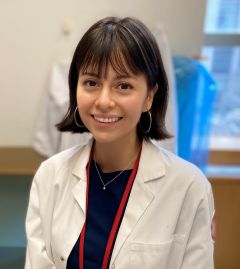
Diana Acosta
Alzheimer’s disease is an extremely prevalent disease in the United States that has no effective treatment. Diana’s project aims to use biophysical, biochemical, and structural biology techniques to test a unique hypothesis that will contribute to our fundamental knowledge of the intrinsically disordered protein, tau. She aims to uncover novel structure-function relationships of tau by studying the effects of post translational modifications on tau physiological interactions, oligomer structure, and oligomer toxicity in neurons. In the long term, her research should facilitate the development of novel therapeutic strategies for treatment and prevention of Alzheimer’s disease.
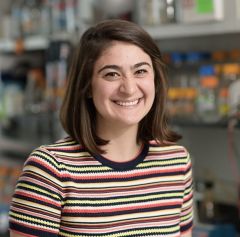
Gina’s research focuses on understanding how mitotic kinases regulate the fidelity of chromosome segregation. Her F31 research project focuses on studying the mitotic kinase Aurora A. She has generated a unique chemical-genetic system that will allow her to more precisely study Aurora A’s functions and substrates. Specifically, she aims to uncover the mechanism of Aurora A in promoting centrosome clustering, a pathway cancer cells rely on for survival in the presence of extra centrosomes. This work will further our understanding of druggable, cancer-specific pathways that could lead to more targeted cancer therapies.

Christopher’s research focuses on using immunotherapies, such as adoptive T cells, to deliver small molecule drugs to tumors. Specifically, he uses tumor specific T cells to deliver enzymes to tumors. These enzymes catalyze reactions which produce potent chemotherapeutics at tumor sites. Projects in precision medicine, such as his thesis work, have the potential to increase the potency of chemotherapeutic drugs while minimizing negative side effects.

Joanna investigates γ-secretase modulators (GSMs), a class of compounds which selectively inhibit pathogenic Aβ species. These compounds influence the activity of γ-secretase, a protease which cleaves amyloid precursor protein in the final step of proteolysis to generate Aβ peptides, and is therefore an attractive drug target for Alzheimer’s disease. However, GSMs have demonstrated limitations in clinical trials and their mechanism has remained elusive. The goal of her project is to better define the molecular mechanism of GSMs to improve their drug design and more effectively treat Alzheimer’s disease.
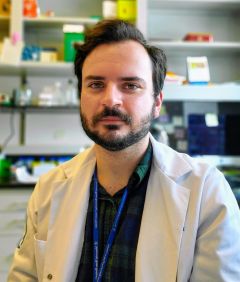
Alexander Minikes
Ferroptosis is an oxidative form of necrotic cell death that may represent a powerful new avenue for cancer therapeutics. Alex and his lab recently found that the tumor suppressive cellular adhesion protein E-cadherin suppresses sensitivity to ferroptosis-inducing drugs by binding E-cadherin molecules on adjacent cells. This binding leads to modulations in signaling processes and reduces expression of genes associated with ferroptosis sensitivity within both cells, forming a cell non-autonomous defense mechanism against ferroptosis. E-cadherin is frequently mutated in gastric cancer, which may indicate a particular efficacy for ferroptosis-inducing treatments. To examine this Alex's project will investigate how ferroptosis is affected by the mutation of E-cadherin in a variety of cellular and mouse models of gastric cancer.
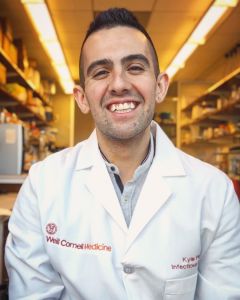
Communicable diseases pose an ever-present threat to the health of our global society, and tuberculosis (TB) remains the world’s leading cause of death from an infectious disease. Kyle’s project takes a deep dive into a brand new class of antibacterial molecules that kill TB-causing bacteria (Mycobacterium tuberculosis). These drug candidates are promising because they block synthesis of the amino acid tryptophan, which humans obtain from dietary sources but M. tuberculosis must produce in order to establish and maintain infection. Using cutting-edge systems biology approaches, his work aims to further support the preclinical development of these drugs as well as lay additional groundwork for developing novel antibiotics targeting bacterial metabolism.
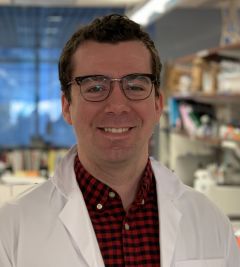
The histone methyltransferase protein EZH2 is highly expressed and frequently mutated in the two most common subtypes of non-Hodgkin’s Lymphoma (NHL), follicular lymphoma (FL) and diffuse large B cell lymphoma (DLBCL). Somatic mutations of EZH2 occur in its catalytic domain and are known to cause enhanced histone 3 lysine 27 tri-methylation (H3K27me3) activity. A dramatic, genome-wide increase in H3K27me3 is apparent in these cases, yet it is unclear what subsequent molecular events are responsible for promoting oncogenesis. Dylan’s work aims to identity the relevant mechanisms of transcription regulation exploited by EZH2 mutations.

Follicular lymphoma (FL) is an indolent disease, displaying few symptoms, and standard clinical practice is to monitor the patient without treatment. However, over time it transforms into more malignant, incurable diseases such as DLBCL. To better inform treatment timing, Chris plans to use mouse models of lymphoma and single cell assays to determine the role of mutations in the epigenetic genes CREBBP and KMT2D often found in FL in both early clonal evolution and the later transformation process.
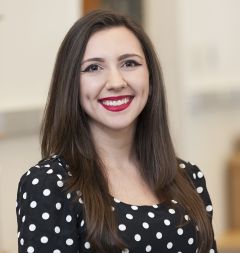
Cassandra Burdziak
Previous studies of Pancreatic Ductal Adenocarcinoma (PDAC) have been largely unable to inform treatment strategies providing substantial improvements in patient outcomes. The challenge in studying this disease stems in part from the extensive cellular heterogeneity that arises during tumorigenesis, which may be overlooked by traditional genomic studies of the bulk tumor. Cassandra’s work leverages single cell transcriptomic and chromatin accessibility measurements collected from genetically engineered mice modeling PDAC progression from the moment of initiation through metastasis. Her project uses novel computational methodology to infer cell type –specific gene regulatory programs in subpopulations of PDAC, such that we may identify dysregulated mechanisms driving disease progression.
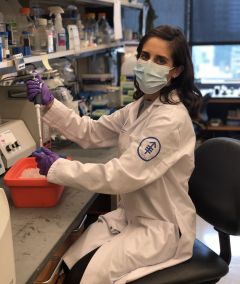
New drugs that target metabolic pathways have shown promise for the treatment of cancer, but the benefits of these drugs have been limited to rare patients whose cancers have mutations in metabolic enzymes. Recently, our lab discovered that hypoxia induces cellular production of the metabolite L-2-hydroxyglutarate (L-2HG), which alters the chromatin landscape and promotes features of stemness in normal and malignant cells. The proposed research will test the importance of L-2HG in normal blood stem cells and leukemia cells and determine whether targeting the L-2HG pathway might be an effective strategy to treat blood cancers.
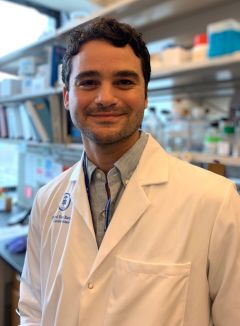
Anthony Michaels
Regulatory T (Treg) cells are our protectors from collateral damage caused by overly exuberant immune responses. In the context of cancer, however, this immunosuppressive cell subset has the capacity to restrain antitumor immunity and promote tumor growth. The goal of my research is to improve our understanding of the metabolic cues that affect the functionality of Treg cells. Specifically, I aim to uncover the mechanisms by which Treg cells sense and respond to alterations in the availability of cholesterol metabolites under homeostatic conditions and in the diseased state. My hope is that this research will accelerate the development of novel strategies for therapeutic manipulation of Treg cell function to improve outcomes in patients with cancer.
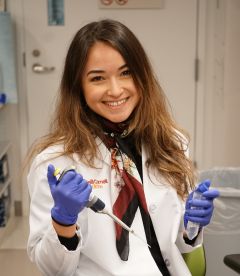
Leona Nease
During metastasis, cancer cells must adapt to the stresses that they face as they detach from the primary tumor, travel through the blood stream and eventually settle in a new organ. Leona’s project aims to understand how these metastasizing cells adapt to high levels of oxidative stress by expressing a family of proteins containing the 21st amino acid, Selenocysteine. Leona is am working to identify the regulatory elements in this stress response pathway and understand how they promote cancer metastasis. By elucidating mechanisms by which metastasizing cells adapt to harsh conditions, she will identify novel targets that can be used to treat such a devastating disease.
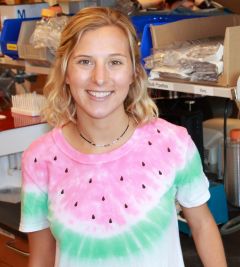
Receptors on T cells have proven successful for cancer therapy due to their ability to specifically target mutated or foreign peptides derived from proteins in any subcellular location, however their therapeutic potential has been limited due to the inability to efficiently identify receptors and their cognate targets. Heather aims to develop a high throughput method to identify the targets of clinically relevant T cell receptors that can be used to detect targets of T cells isolated from tumors. Our method screens T cell receptor reactivity against tens of thousands of genetically encoded target peptides. Identification of T cell receptor targets will expand the therapeutic potential of T cells for cancer treatment.
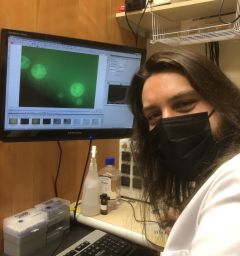
Ryan Ries
N6-methyladenosine (m6A) is a nucleotide modification in mRNA that reduces mRNA stability, and deregulation of m6A has been linked to development and cancer. The YTHDF proteins that bind to m6A can ‘phase separate’, or form protein droplets in the cytoplasm, creating m6A mRNA-rich droplets in the cell. Ryan’s studies aim to determine how phase separation modulates m6A mRNA stability and may lead to the discovery of new pathways that allow for therapeutic intervention in m6A-linked diseases.
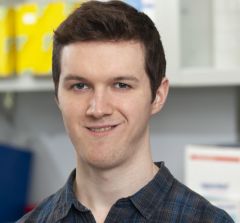
Andrew focuses on the study of Alzheimer’s disease (AD), the most common neurodegenerative disease in the United States. There are currently limited treatment options and a narrow understanding of disease mechanisms. Induced Pluripotent Stem Cells (iPSCs) provide a unique opportunity to study AD by providing an unlimited supply of disease-relevant human tissue while retaining the genetic background of the patient donor. Unfortunately the age of the patient cell is erased upon iPSC reprogramming, presenting a major challenge for modelling late-onset diseases where pathology takes decades to progress. Thus, his project aims to develop novel induced aging strategies for iPSC-derived cells to mimic physiological aging and establish an age-implicated in vitro model of AD.
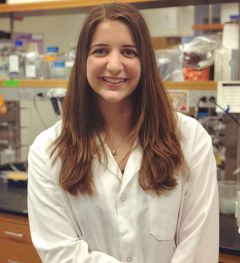
Vanessa is interested in the circuit-level roles of GPCR-mediated synaptic modulation in animal models of psychiatric disorders, where she currently uses photo-pharmacology to study the role of mGluR2 in cognition, anxiety and depression. Her project uses new optogenetic techniques to address signaling and behavioral changes elicited by presynaptic mGluR2 modulation within the prefrontal cortex of rodent models of mood disorders. Broadly, this work will further the understanding of glutamatergic signaling in the brain, and how mGluRs can be targeted as the next generation of treatments for psychiatric disorders.
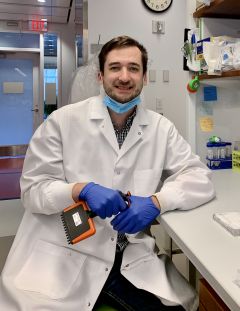
Benji focuses his research efforts on exploring the tolerogenic and pathologic interactions between innate lymphoid cells (ILC) and T cells in autoimmunity. In particular, his project studies the role of Group 3 innate lymphoid cells (ILC3) in the context of Multiple Sclerosis (MS), a human autoimmune disorder that primarily involves chronic inflammation of the central nervous system. Using a variety of experimental approaches, he has been interrogating whether ILC3 perform essential roles in the immune pathogenesis or resolution of neuroinflammation in MS, which could be utilized in the design of novel therapies to treat MS and other autoimmune diseases.
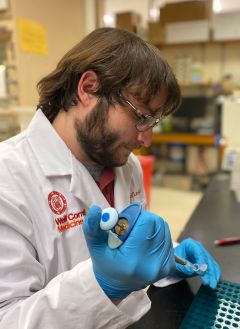
Thomas researches age-related neurodegenerative diseases, such as Alzheimer’s disease. Specifically, his project plans to study how lysosomes, cellular organelles that are responsible for degrading and clearing the misfolded protein aggregates, contribute to the pathogenesis of Alzheimer's disease. Current theories predict that increasing lysosomal degradation will enhance the clearance of accumulated protein aggregates and improve cognitive function. His project is focused on developing and characterizing a novel pharmacological tool that will increase lysosomal degradation.

